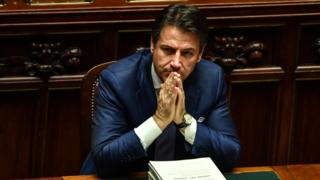Italy budget: Parliament passes budget after EU standoff
 Image copyright
Image copyright
AFP
PM Giuseppe Conte said the budget was “the first stage of a broad and ambitious plan of reform”
Italy’s parliament has approved a revised budget for 2019, amid opposition complaints that it was dictated by the EU.
The country’s populist government had originally vowed to push through costly campaign promises including a universal basic income.
But in October, the European Commission raised concerns about the impact of such spending on Italy’s debt levels.
Rome was told to revise its budget, or face fines and disciplinary action.
Under a deal struck with the Commission last week, Italy lowered its planned budget deficit from 2.4% of GDP to 2.04% – less of a reduction than European officials had hoped for.
Image copyright
Reuters
Democratic Party deputies accused the government of increasing taxes and cutting pensions
The value of its concessions is understood to be a little more than €10bn (£9bn).
The Senate approved the budget last week, and the lower house of parliament passed the revised proposals in a confidence vote on Saturday, with 327 votes in favour, 228 against, and one abstention.
Opposition lawmakers have complained that the last-minute deal with Brussels left parliament unable to debate the altered proposals.
The centre-left Democratic Party has filed a complaint with Italy’s Constitutional Court, and its supporters held a protest outside parliament.
The deadline for passing the budget was 31 December, after which the government would have been forced to continue with the 2018 budget on a monthly basis.
What’s in the budget?
Italy’s coalition government, made up of the anti-establishment Five Star Movement and right-wing League, has pledged the following:
- A new income support scheme known as the “citizens’ wage” will pay €780 ($890; £700) a month to 1.7 million of Italy’s poorest families. The measure is forecast to cost €7.1bn.
- The retirement age will be cut from the current 67 to 62, for workers who have paid into the pension system for 38 years.
- More than a million self-employed workers earning under €65,000 a year will see their taxes cut to 15%.
Prime Minister Giuseppe Conte has hailed the budget as “the first step of a broad and ambitious plan of reform” which he said would “turn Italy inside out like a sock” and kick-start economic growth. Critics argue that the plan does not create investment incentives, however.
The European Commission has said it will watch closely to ensure the budget agreement is adhered to. The threat of disciplinary action remains if it is not.



